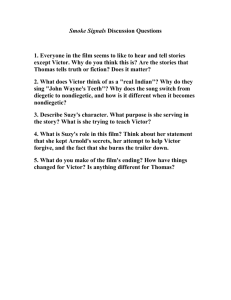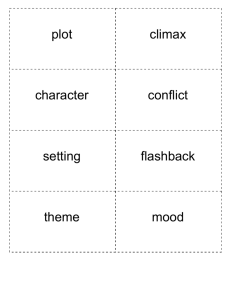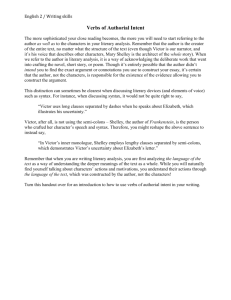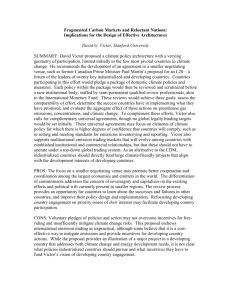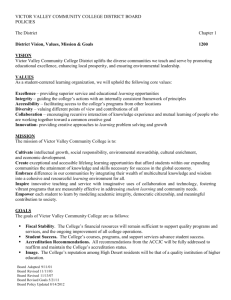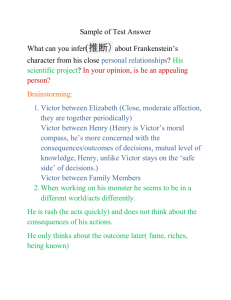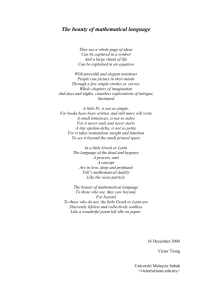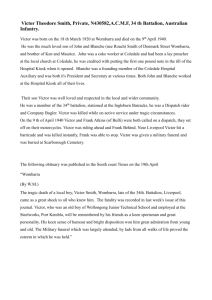Literary Terms Quiz Review: Short Story Unit
advertisement
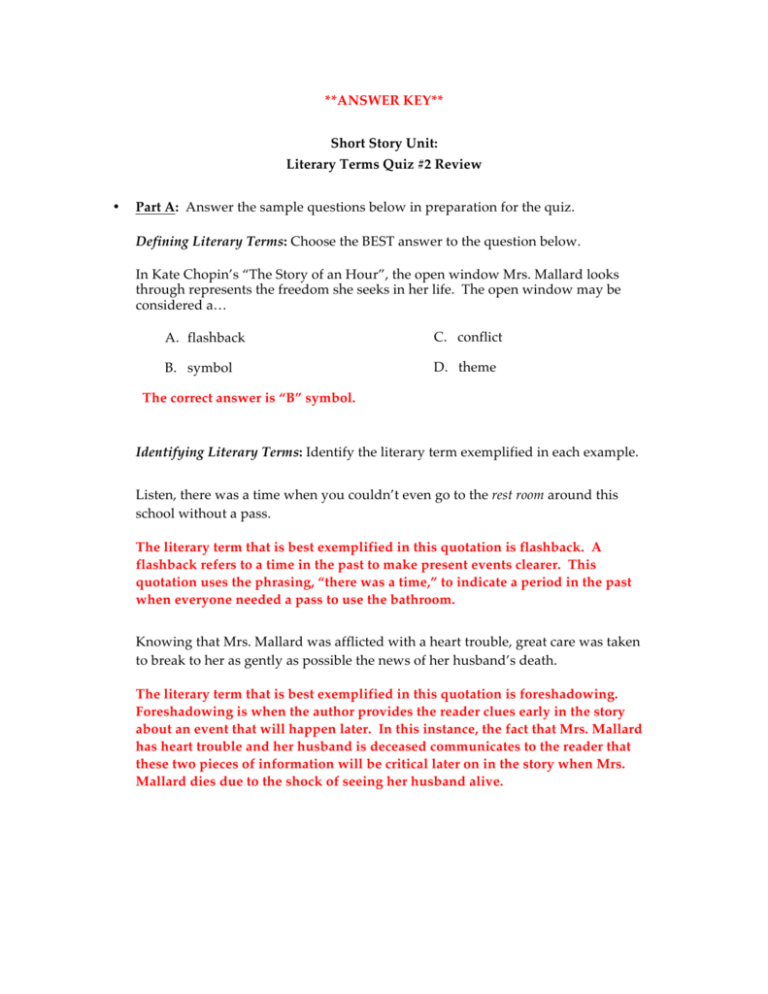
**ANSWER(KEY**( ( Short(Story(Unit:( Literary(Terms(Quiz(#2(Review( ( • Part(A:((Answer'the'sample'questions'below'in'preparation'for'the'quiz.' Defining'Literary'Terms:(Choose'the'BEST'answer'to'the'question'below.' In Kate Chopin’s “The Story of an Hour”, the open window Mrs. Mallard looks through represents the freedom she seeks in her life. The open window may be considered a… A. flashback C. conflict B. symbol D. theme The correct answer is “B” symbol. ( Identifying'Literary'Terms:(Identify'the'literary'term'exemplified'in'each'example.' ' Listen,'there'was'a'time'when'you'couldn’t'even'go'to'the'rest%room%around'this' school'without'a'pass.' ' The literary term that is best exemplified in this quotation is flashback. A flashback refers to a time in the past to make present events clearer. This quotation uses the phrasing, “there was a time,” to indicate a period in the past when everyone needed a pass to use the bathroom. ' Knowing'that'Mrs.'Mallard'was'afflicted'with'a'heart'trouble,'great'care'was'taken' to'break'to'her'as'gently'as'possible'the'news'of'her'husband’s'death.' ' The literary term that is best exemplified in this quotation is foreshadowing. Foreshadowing is when the author provides the reader clues early in the story about an event that will happen later. In this instance, the fact that Mrs. Mallard has heart trouble and her husband is deceased communicates to the reader that these two pieces of information will be critical later on in the story when Mrs. Mallard dies due to the shock of seeing her husband alive. ( Applying'Literary'Terms:(Answer'the'following'question'based'upon'the'passage' provided'from'Gary'Soto’s'“Seventh'Grade.”''Be'sure'to'write'in'complete'sentences' and'T.T.Q.A.' ' ! ! ! ! ! On the first day of school, Victor stood in line half an hour before he came to a wobbly card table. He was handed a packet of papers and a computer card on which he listed his one elective1, French. He already spoke Spanish and English, but he thought some day he might travel to France, where it was cool; not like Fresno, where summer days reached 110 degrees in the shade. There were rivers in France, and huge churches, and fair-skinned people everywhere, the way there were brown people all around Victor. Besides, Teresa, a girl he had liked since they were in catechism classes at Saint Theresa’s, was taking French, too. With any luck they would be in the same class. Teresa is going to be my girl this year, he promised himself as he left the gym full of students in their new fall clothes. She was cute. And good in math, too, Victor thought as he walked down the hall to his homeroom. He ran into his friend, Michael Torres, by the water fountain that never turned off. They shook hands, raza-style, and jerked their heads at one another in a saludo de vato. “How come you’re making a face?” asked Victor. How does the author characterize Victor in this passage? Explain how at least two (2) specific examples from the passage act as characterization. ' S.T.E.A.L.' S(peech): “How come you’re making a face?” – Victor is questioning why his friend, Michael, reacts with a face after doing their customary handshake greeting. Clearly, Victor understands that something is bothering Michael. T(houghts): “Teresa is going to by my girl this year, he promised himself…” – Victor is making it his personal goal to make Teresa his girlfriend. He has liked her for a while, but this year he will finally act on his feelings. E(ffects on others): “They shook hands, raza-style…” – Upon seeing Victor, without using any words, Michael is able to issue their customary greeting. It is evident that the two are old friends because of their specific greeting. A(ctions): “…he left the gym full of students in their new fall clothes” – This quotation gives the reader a specific setting for understanding Victor: September, in a school. Victor leaves the gym to begin his day with purpose. L(ooks): “There were rivers in France, and huge churches, and fair-skinned people everywhere, the way there were brown people all around Victor.” – Here, the author, Gary Soto, refers to Victor’s and his own Mexican-American heritage. This is also alluded to when Victor shares that he speaks both Spanish and English fluently. ' ! ! ' • Part(B:((Read'Avi’s'“Superpatriot”'and'see'if'you'can'identify'the'following'literary' devices'in'the'text.''Record'your'observations'in'the'chart'below.''' ' Literary(Term( ( ( Point(of(View( ( ( Theme( ( ( Flashback( ( ( Tone( ( ( Dialogue( ( ( Foreshadowing( ! Short(Story(Example(&(Explanation( Text(Example:( “I'never'could'read'enough'about'them.”( Explanation:( First'person,'use'of'“I”'by'narrator( Text(Example:( “Soon'as'I'read'that'line,'I'knew—as'sure'as'I'knew' anything—that'my'motives'had'not'been'pure.”( Explanation:( The'theme'of'selfishness'not'being'a'psotive/redeeming' quality'for'the'author'is'addressed'here.( Text(Example:( “It'happened'in'1946.”( Explanation:( Going'back'in'time'in'the'story( Text(Example:(( “Shazam!%–'they'turned'into'superheroes”( Explanation:( Communicates'his'awe'of'superheroes' Text(Example:( “‘Don’t'you'think'you'should'send'them'off'to'the'hospital?’”( Explanation:( These'are'the'author’s'mother’s'actual'words'said'aloud'to' the'author.( Text(Example:( “After'all,'I'had'mastered'half'the'role—being,'like'Clar'Kent,' mild'mannered.”( Explanation:( Predicts'aim'to'be/failure'to'be'superhero(
